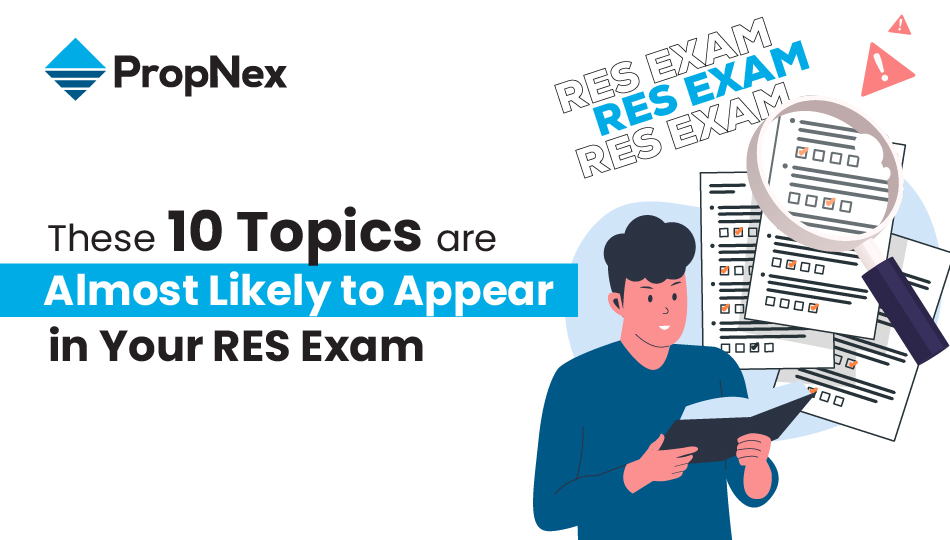PropNex Picks
|June 05,2025These 10 Topics Are Almost Likely to Appear in Your RES Exam
Share this article:
So, you're gearing up for the RES exam? First of all, big kudos - it's a huge step toward launching your real estate career! But let's be real: preparing for it can feel like trying to finish a buffet with 20 different cuisines - where do you even begin?
Between legal terms, calculations, HDB policies, planning regulations, and ethical rules, the syllabus isn't light. And with paper 1 and 2 structured to test both your theoretical knowledge and practical judgement, it's natural to feel a little overwhelmed.
But here's a dose of good news: some topics tend to appear again and again. They're exam favourites, and if you know how to spot them, you've got a strategic advantage.
We've pulled together 10 high-probability, frequently tested concepts from RES Booster Papers, case studies, and seasoned trainers. Master these, and you'll not only feel more confident - you'll also save yourself a ton of last-minute cramming.
Let's break them down in a fun but practical way, so you can walk into your exam with clarity and confidence.
Ah yes, foreign ownership rules - a hot favourite. Even as the number of private homes bought by foreigners continues to drop, it is one of the key topics tested in the RES exam. If you can remember which properties need LDAU approval, you're already ahead.
Here's the gist:
Foreigners CAN'T buy landed homes (unless part of a condo), GCBs, and vacant residential land.
Foreigners CAN buy private condos and commercial/industrial properties
Why it matters: This is one of the most heavily tested concepts in the RES syllabus. Examiners love throwing in curve balls that challenge your understanding of ownership restrictions.
Tip: Burn the six restricted categories into your brain and flip the logic to spot the safe bets. Create a visual table or mind map to link property types with foreign eligibility.
Sometimes the exam throws you a case where a buyer finds a nasty surprise after signing the contract. No "subject to" clause, though. Now what?
What to do: Cue the common law principles. This is where your grasp of implied terms, misrepresentation, and latent defects really gets tested.
Key concepts:
Misrepresentation: False statement that induces a contract
Hidden encumbrances: Not disclosed but affect the buyer
Implied terms: Reasonable assumptions courts may enforce
Tip: Train yourself to identify what's missing in a scenario. If it's not in black-and-white, ask: Would the courts allow cancellation or compensation?
Zoning and land use might sound dry, but this is where URA gets spicy. Many RES candidates confuse land zoning, plot ratio, and land use intensities - which is why this area is tested so often.
The golden rule:
Residential with commercial? Max 40% can be commercial.
Hotel sites? Must be at least 60% hotel use.
Why it matters: Many scenarios include "White Sites" and mixed-use plots. These are sneaky areas that can trip you up unless you're super familiar with the URA guidelines.
Tip: Practise interpreting site plans or simulated URA queries. The trick is to read the zoning codes like a developer would.
Is that swanky chandelier staying or going? You'd better know. This topic often shows up in disputes over what's included in a sale, especially in resale or landed property questions.
This is mostly part of typical OTP mistakes that many Singaporeans are unaware of.
Remember the two tests:
Degree of annexation: How physically fixed is the item?
Purpose of annexation: Was it meant to be permanent?
Why it matters: The exam may describe items ambiguously (e.g., a wall-mounted mirror, a kitchen island). You'll need to apply the tests logically.
Tip: When in doubt, ask: can the buyer reasonably expect it to stay? Always lean toward the purpose test for your final answer.
Not all property rights are created equal. The exam frequently tests your understanding of who can claim what in a property transaction.
Quick breakdown:
Legal rights: Protected even if sold to a new buyer
Equitable rights: May be defeated by a bona fide purchaser
Personal rights: Agreements between individuals; not enforceable against new owners
Scenario example: A tenant with an unregistered lease claims interest after a sale. Legal or equitable? You decide.
Tip: Flashcards help here. Categorise rights and test yourself in their enforceability under various sale conditions.
Some case study questions test subtle professional ethics, especially around helping the other party with documentation.
Common pitfalls:
Forgetting to disclose non-representation
Collecting a fee without proper declaration
Assuming neutrality without client consent
Tip: A salesperson can assist the non-client party only if:
It's clear they are not representing them
The actual client provides written consent
No fee is collected from the other party
Why it matters: This isn't just common sense - it's a compliance checkpoint. Always reference the Estate Agents Act when in doubt.
Joint Tenancy and Tenancy-in-Common sound similar, but they're legal opposites. Examiners love testing your ability to tell them apart.
JT = Equal shares, right of survivorship. TIC = Unequal shares, can will your portion.
Typical scenario: A couple buys a unit, one passes away. What happens to their share?
Tip: Highlight keywords like "equal", "unequal", or "right of survivorship" to identify the correct co-ownership structure.
PDPA isn't just about getting consent to contact prospects anymore. Examiners are increasingly focusing on the latest amendments and data breach implications.
What's hot:
Mandatory breach reporting: Required if more than 500 people affected or risk of serious harm
Deemed consent: Arises via notification or contractual necessity
Why it matters: Many RES candidates skip the fine print of PDPA changes, which makes them easy targets for MCQ traps.
Tip: Create a timeline of PDPA changes. Pay close attention to what triggers reporting and what counts as sensitive data.
These two planning metrics are easily confused but totally distinct. The exam will test your ability to apply them separately.
Plot ratio = how much floor space can be built relative to site area. Height limit = maximum vertical height in metres or storeys.
Scenario example: A development is low-rise but high-density. Can it exceed height limits? Possibly not.
Tip: Always check which metric is being assessed. If it's about space efficiency, think plot ratio. If it's about skyline impact, think height.
Many candidates dread calculation, but this is the one place where answers are objective. If you know the formulas, you score.
What to revise:
CPF grants: Basic, Additional, and Enhanced
Buyer's Stamp Duty: Based on purchase price or market value (whichever is higher)
Rental income: Gross vs net rental income and deductibles
Progressive payments: Common in new launches
Loan eligibility calculations: Understanding how MSR and TDSR, loan tenure, interest rates, and income affect how much buyers can borrow
Tip: Set aside time to drill calculations. Use past questions to get used to multi-step problem-solving under pressure.
If you've made it this far in your RES prep - kudos! You're already showing the kind of drive that'll take you places in the real estate world. When in doubt, answer in the best interest of your client. Many MCQs are designed to test ethical judgment - so if you're torn between two choices, pick the one that protects or benefits the consumer.
But let's not sugar-coat it: even the most prepared candidates hit rough patches before exam day.
That's where smart revision comes in - and the right support makes all the difference.
Need a quick boost before exam day? Check out RES revision courses online - designed for last-minute polishing, tricky topic clarification, and answering techniques that work.
Prefer not to spend on a course? No worries - some PropNex leaders also run free study groups for RES candidates. It's a great way to ask questions, revise together, and get real insights from those who've been there.
Keen to learn more about our upcoming sessions? Head over to www.propnex.com/joinus for full details.
At PropNex, we don't just help you start. We help you thrive:
Learn from industry veterans at PNG Academy
Leverage powerful tools through PropTech innovations
Plug into a community that wants you to succeed
Thinking of your next step post-RES? Let's chat. We're here to help you launch strong.
Views expressed in this article belong to the writer(s) and do not reflect PropNex's position. No part of this content may be reproduced, distributed, transmitted, displayed, published, or broadcast in any form or by any means without the prior written consent of PropNex.
For permission to use, reproduce, or distribute any content, please contact the Corporate Communications department. PropNex reserves the right to modify or update this disclaimer at any time without prior notice.









